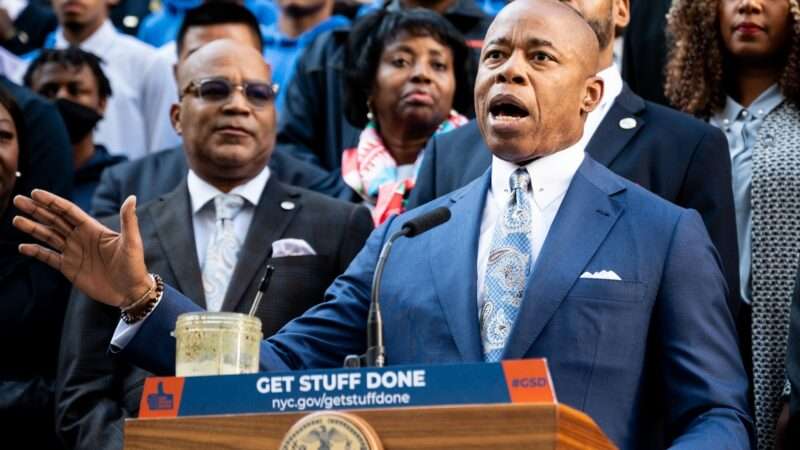
New York City Mayor Eric Adams announced Tuesday that he is directing police and other first responders to remove people with severe mental illness from the city's streets for involuntary psychiatric evaluations and hospitalizations, but the new policy will almost certainly face legal challenges from civil liberties groups, who say it tramples on well-established constitutional rights.
In remarks yesterday, Adams, who has also ordered aggressive clearings of homeless encampments in the city, characterized the new policy as a way to ensure mentally ill people on the streets receive compassionate care.
"The man standing all day on the street across from the building he was evicted from 25 years ago waiting to be let in; the shadow boxer on the street corner in Midtown, mumbling to himself as he jabs at an invisible adversary; the unresponsive man unable to get off the train at the end of the line without assistance from our mobile crisis team: These New Yorkers and hundreds of others like them are in urgent need of treatment and often refuse it when offered," Adams said.
Adams' policy directive states that, "If the circumstances support an objectively reasonable basis to conclude that the person appears to have a mental illness and cannot support their basic human needs to an extent that causes them harm, they may be removed for an evaluation."
The policy relies on an expanded interpretation of New York's mental health laws, which allow judges to compel someone with serious mental illness to take medication or undergo supervised psychiatric treatment if two physicians determine that the person's mental illness is "likely to result in serious harm to himself or others."
"The common misunderstanding persists that we cannot provide involuntary assistance unless the person is violent," Adams said. "Going forward, we will make every effort to assist those who are suffering from mental illness."
However, New York Civil Liberties Union (NYCLU) Executive Director Donna Lieberman said in a press release that Adams proposed expansion is "likely to violate" state and federal constitutional limits on when people with mental illness can be involuntarily committed.
"The Mayor is playing fast and loose with the legal rights of New Yorkers and is not dedicating the resources necessary to address the mental health crises that affect our communities," Lieberman said.
Adams' policy directive itself notes that "case law does not provide extensive guidance regarding removals for mental health evaluations based on short interactions in the field."
The Supreme Court ruled in the landmark 1975 case O'Connor v. Donaldson that mental illness alone is not a justification for indefinite custodial confinement, and that "a State cannot confine, without more, a nondangerous individual who is capable of surviving safely in freedom by himself or with the help of willing and responsible family members or friends."
"May the State fence in the harmless mentally ill solely to save its citizens from exposure to those whose ways are different?" Justice Potter Stewart wrote in the Court's majority opinion. "Mere public intolerance or animosity cannot constitutionally justify the deprivation of a person's liberty interest."
Since the ruling in O'Connor v. Donaldson, most state's laws surrounding involuntary psychiatric evaluations and commitments require that the person be a danger to themselves or others. Adams is also calling on the state legislature to amend New York's involuntary commitment law, Kendra's Law, to clarify that "likely to result in serious harm" encompasses basic survival needs such as shelter and food.
Such a change could have broad implications for homeless and disability rights, and give the state much more power to confine people against their will.
The NYCLU already opposes Kendra's Law in its current form. The organization argues the law unconstitutionally expanded the circumstances under which the state can compel people against their will to undergo mental health treatment.
Civil liberties advocates are also worried that police are not qualified to determine on the spot when someone is mentally ill and unable to care for themselves.
"I'm also concerned about when someone out on the street, a police officer makes the determination that someone because they smell, because they haven't had a shower for weeks, because their clothes are disheveled, they're mumbling to themselves. That in and of itself doesn't mean that you're a danger to yourself or others, or even under the watered-down standard that it means that you're likely to result in serious harm to yourself or others," civil rights lawyer Norman Siegel told Gothamist.
The potential for police abuse is not hypothetical; it's happened before. In 2009, NYPD officers raided the apartment of fellow officer Adrian Schoolcraft after Schoolcraft blew the whistle on illegal quotas in his precinct. Schoolcraft's brothers in blue then had him involuntarily committed to a psychiatric ward for six days. They also made a challenge coin celebrating their handiwork, which depicted Schoolcraft as a squealing rat in a straitjacket being hauled off in the back of an ambulance.
The only likely delay in a legal challenge to Adams' new policy will be the time it takes advocacy groups to find a client affected by it, and they won't have to wait long.
The post Eric Adams' Plan To Involuntarily Hospitalize Mentally Ill Homeless People Will Face Legal Challenges appeared first on Reason.com.







